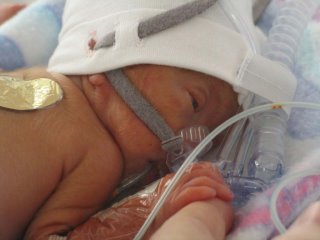Measuring the brain development of premature babies in their first weeks of life can show those likely to have difficulties, scientists suggest.
An Imperial College team found babies with less brain surface development had poorer mental skills at the age of two.
If confirmed in larger studies, the researchers say it may be possible to identify which children need more support and to provide it earlier.
The research is published in the Public Library of Science Medicine.
Half of all babies who survive after being born very early go on to develop a disability or learning difficulty, past research has found.
The cortex, the surface area of the brain, should change from looking like a coffee bean to looking like a walnut while a foetus is in the womb.
If a baby is born prematurely, that development needs to take place outside the womb - with all the different stresses the baby will be under at that time.
'Smooth' surface
The researchers used MRI (magnetic resonance imaging) scanning to measure brain growth of 113 babies born prematurely between 22 and 29 weeks gestation.
A baby is normally born at 40 weeks.
The premature babies were scanned up to the point when they would have been eight weeks old, if the pregnancies had gone to term.
Sixty-three of these children were then assessed to see how they were developing mentally when they were about two years old.
The slower the rate of growth of brain surface area and the smoother it was compared to brain volume, the more likely it was for a child's development to be delayed.
Boys born very premature were the most likely to be affected.
The researchers identified that a temporary "marshal" for brain development - called the cortical subplate - underneath the cortex directs neurons to go where they are needed.
The subplate, a network of cells, develops at 24 weeks, and is at its biggest at around 28 to 30 weeks.
When very premature babies are born, the subplate is abnormal and tissue is damaged.
In babies born at full term, the plate has disappeared - because it has done its job - and the surface of the brain has taken on its usual "rippled" appearance.
Long term outcomes
The team, led by Dr David Edwards, says the technique is simple to use and that if the results are confirmed in future studies, it might be possible to use scans to identify which children might need development support later on.
Dr Edwards said: "Now we know what we are looking for, we can try a treatment.
"We are going to look at using melatonin, which is a very powerful neuroprotector, and a powerful way of protecting damage due to a lack of oxygen and nutrients."
Neil Marlow, professor of neonatal medicine at Queen's Medical Centre in Nottingham, said: "This is an important paper.
"The effect has been described before but this study provides clear evidence that there is a biological basis to what has been observed as babies grow up.
"It also means that if changing the way we do something in the neonatal period produces better and more complex brain growth, this may mean longer term outcomes are improved."
He added: "The challenge for all of us is to work out why these changes in brain development happen and the extent to which they are preventable.
"As we have got so much better at looking after such immature babies after they are born, trying to optimise long-term outcomes has become a challenge."
Source: BBC


No comments:
Post a Comment